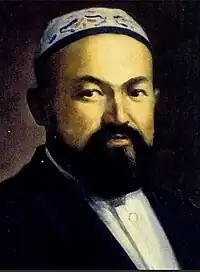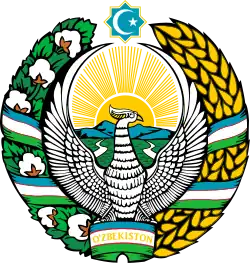Munawwar Qari Abdurrashidkhan ogli
Munawwar Qari Abdurrashidkhan ogli (Cyrillic Мунаввар Қори Абдурашидхон ўғли; Arabic name منور قارى ابن عبد الرشيد خان) (*1878 in Tashkent; † 1931) was a leading Jadidist of late Tsarist Turkestan. Like other Jadids, Munnawwar Qari worked as author, poet, teacher, journalist and in other occupations.
Munawwar Qari Abdurrashidkhan ogli | |
|---|---|
 | |
| Born | 1878 Tashkent |
| Died | 1931 |
| Occupation | Teacher, theorist, journalist, educator, writer, and scholar |
| Literary movement | Jadidism |
Life
Munawwar Qari was the youngest child in a family of Tajik[1] Islamic scholars and received his education in Tashkent and Bukhara. In 1901, he opened Tashkent's first Maktab to follow the Jadids new method of teaching. He also wrote textbooks for use in schools and published literary works of other authors, while publishing and editing The Sun, one of the first independent newspapers in Russian Turkestan.[2]
After the Russian Revolution, he continued working as a teacher, but was arrested and deported to a Gulag camp in 1925[3] and shot in 1931 after being convicted for "counter-revolutionary activities".[2] His grave can be found in Moscow's Yagankovo cemetery.[4]
Scientific and political activity
In 1901, he opened a new-style school and developed a special curriculum and textbooks for these schools.[5] He started teaching in 1903 when the new schools were established.[6] For these schools, he wrote "Adibi Avval" ("First Writer," 1907), a textbook for learning the alphabet, and "Adibi Soniy" ("Second Writer," 1907). In these, "Himmatli Faqir" poem is included, and educational books were published several times.[7] From 1904, he became involved in social, political, and cultural life.[5] From 1906, he worked as a literary contributor for the "Oʻrta Osiyoning Umurguzorligi, Taraqqiy," and "Taraqqiy" newspapers.[8] That year, he founded the "Xurshid" newspaper as an editor and a writer.[6] In 1908, his collection "Sabzazor," "Yer Yuzi" (about geography), and "Tajvidal Qurʼon" (teaching the Quran) books were published and used as textbooks in new-style schools.[7] He also managed the "Shuhrat" (1907), "Tujjor" (1907), and "Osiyo" (1908) newspapers and carried out the duties of a literary contributor. Later, he worked as the responsible editor in the "Sadoyi Turkiston" (1914-1915) newspaper, the confidential editor in "Al-Islah" journal (1915-1917), and as a responsible editor in the "Najot" and "Kengash" (1917) newspapers.[8][5]
Munavvarqori ibn Abdurashidxon was an organizer of various societies and associations. He was a founder, editor, head, and member of various societies, organizations, partnerships, and associations, such as "Jamiyati Imdodiya" (1909), "Turon" (1913), "Turkiston Kutubxonasi" (1914), "Umid" (1914), "Maktab" (1914), and "Koʻmak" (1921).[6] During the government of the Shuro leaders, he was the head of the People's Enlightenment of the People's Educational Commission (1918), the head of Tashkent city's public education department, a delegate and a member of the East People's Congress (1920, Bukhara).[6] He was the head of the BXSR Public Enlightenment and Waqf Department (1920-1921), the head of the Tashkent city's social education department (1921), a teacher at the Navoiy School and the Narimonov Pedagogical Technical Institute (1923-1925), a scientific worker at the museum in Samarkand, and a responsible secretary of the Tashkent-Fergana branch of the Uzbekistan Antiquities Preservation Committee (1927-1928).[5]
Family
He was born into a noble family in the Darxon neighborhood of Shaykhantakhur district in Tashkent city.[6][8] His father, Abdurashidxon Sotiboldixon, was a teacher, and his mother, Khosiyat, was the daughter of the teacher Xonxoʻja Shorahimxoʻja. He was the third son in the family. Munavvarqori received his initial education from his parents and the neighborhood school.[7] Additionally, his elder brothers, Aʼzamxon (1872-1919) and Muslimxon (1875-1954), also provided him with instruction.[5]
See also
Literature
- Adeeb Khalid: 'The Politics of Muslim Cultural Reform: Jadidism in Central Asia, Berkeley 1998.
- Charles Kurzman: Modernist Islam, 1840–1940. A Sourcebook, New York 2002, p. 227.
- Edward Allworth: Central Asia. 120 Years of Russian Rule, London 1989.
References
- Allworth, Edward (1989). Central Asia, 120 Years of Russian Rule. Duke University Press. ISBN 978-0-8223-0912-3.
- Charles Kurzman: Modernist Islam, 1840–1940. A Sourcebook, New York 2002, p. 33.
- Adeeb Khalid: The Politics of Muslim Cultural Reform: Jadidism in Central Asia, Berkeley 1998, p. 300.
- Uzbek Soviet Encyclopedia, Tashkent-1978, Book checked 22 March 2016
- Xolboyev, Sotimjon (2022). Jadidlar- Munavvarqori Abdurashidxonov [Jadidlar - Munavvarqori Abdurashidkhanov] (PDF) (in Uzbek). Tashkent: YOSHLAR NASHRIYOT UYI. ISBN 978-9943-6682-8-7.
- "Abdurashidxonov Munavvar qori". arboblar.uz. Retrieved 18 October 2023.
- "Munavvarqori Abdurashidxonov (1878-1931)". www.ziyouz.com. Retrieved 18 October 2023.
- "Munavvarqori Abdurashidxonov (1878-1931)". bilimlar.uz. Retrieved 18 October 2023.
